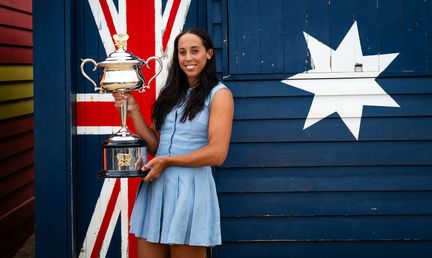NEW YORK, NY, USA - Billie Jean King recalled moments of both heartbreak and triumph as she recalled the seminal moments of her incredible life of athletics and advocacy during an exclusive Wall Street Journal panel at the Whitby Hotel in advance of the US Open. The discussion was the second leg of a three-part Tennis Legend event series held exclusively for WSJ+ members.
The timing of King's talk could not be more perfect. Named one of the "100 Most Important Americans of the 20th Century" by Life magazine and a 2009 recipient of the Presidential Medal of Freedom (the highest civilian honor in the United States), King is back under the spotlight with the upcoming release of the film "The Battle of the Sexes".
The movie, starring Emma Stone, chronicles the events leading up to that seminal 1973 exhibition match against Bobby Riggs that elevated King into the national consciousness. That match came on the heels of King's formation of the WTA tour a couple of months earlier, carried out with the WTA's "Original Nine," who signed symbolic one-dollar contracts to form the first women's professional tennis tour.
After an incredible career that saw her ranked No.1 and win 39 major titles in singles, doubles, and mixed doubles, King poured her indefatigable energy into a post-tennis life defined by her advocacy for equal rights.
Here are some highlights from King's discussion with WSJ+ members:
On her trailblazing life as a tennis champion and advocate:
"If someone had told me at 11 years old I would have had this life, I would said are you kidding? I wanted to be No.1 at 11 years old, but I had no idea I that I would have this journey that I've had. It's been amazing. There's been heartache along the way, but overall it's been unbelievable."
"Sports is great because it's about delayed gratification. With everything so quick right now. it's so important for our children to be in sports or music because it's about delayed gratification. It's very important to learn that quality in life."
On the catalyst for her passion for equality:
"When I was 12-years-old I had this epiphany when I was daydreaming out at the Los Angeles Tennis Club. I started thinking about tennis and how small it was. Everyone who played was wearing white shoes, white socks, white clothes playing with white balls. Everyone who was playing was white. I said to myself, where is everybody else? I think when you look at my journey it stems back to that moment in time."
"Tennis gave me this unbelievable platform where you have an opportunity to make a difference in people's lives. It's nice to play, but my real joy came from moving things forward with people. When I think of myself I think more about that then I think about tennis."
On the formation of the WTA and equal prize money at the Slams:
"For me personally, when people ask me what the 70s were like, all I can think about is being tired. I was averaging four hours of sleep. And then we had matches to play. We were having meetings constantly - we had one meeting that lasted until 4am - and of course the tournament was going to happen by 9 or 10, first match. The women were amazing. All the Original 9 were amazing."
"The more you give, the more you get. That's what the players and human beings have to understand. Did I understand that then? No. I could picture what I wanted for the world and for the sport, and I wanted to make it a better place. I knew if we could do better, the world could do better.
"When we got equal prize money at the majors in 2007 finally, thanks to Venus Williams and the great leadership at the WTA, it's about the message. When people see we make the exact same amount, they're going to say: "Wow, anything is possible". You don't know how you're going to touch a person's life. That's why it's so important for people to know they're an influencer. Every person in the world is an influencer."
On the upcoming Battle of the Sexes movie:
"It's not just about the tennis match. It's about Bobby's marriage, my marriage, my sexuality, it was a horrific time in my life off the court, just trying to figure my life out. That's why I didn't go into politics. I could have gone into politics right after that. If I could live that over again, if that would have happened now, I would have gone into politics for sure to try and help people."







